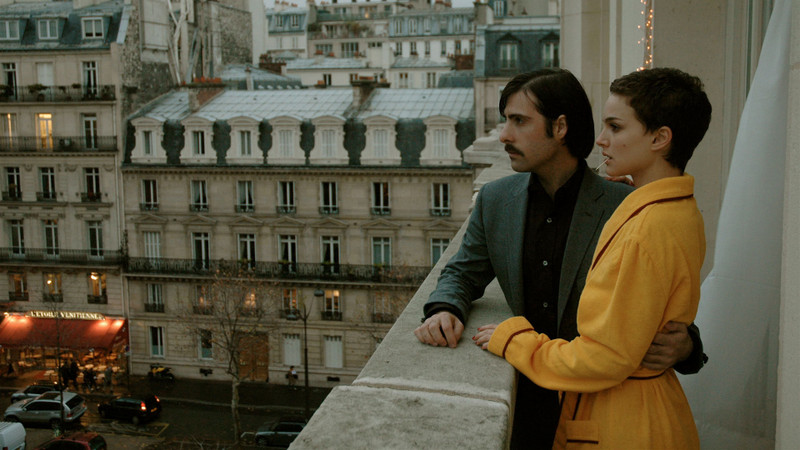Wes Anderson’s short film “Hotel Chevalier” is a lean, bruised and naked tale in a Paris hotel room. Anderson shot the short with his own funds (and the actors, Natalie Portman and Jason Schwartzman, donated their time) two years prior to his feature The Darjeeling Limited but it was often screened at the same time and is referred to by many as a prologue to that feature film that followed it (as mentioned in this previous NC at the Movies entry). The two are aesthetically consistent, but that’s not surprising as most of Anderson’s films belong to the same visual palate and characters seem descended from the same family tree.
Though they were conceived separately, Anderson brought the short and feature together through their common character of Jack Whitmore. Whitmore is precious, careful and, in his manicured construction of his hotel room a bit compulsive. In contrast, his beloved shows up with her fierce toothpick-in-mouth machismo, her velociraptor-attack dialogue (“What the fuck is going on?”), and her sudden bruised nakedness.
It is an uncomfortable film on several levels: visually there are the awkward, stagey wide shots of the room, the contrasting dolly shots and camera pans, the manicured way Jack has designed the room for his beloved’s arrival (complete with soundtrack queue on the ipod and a freshly painted painting): has he created the perfect setting for their reunion or a well designed bunker to defend himself against her impending assault? And does it matter since either would be in vain?
Then there is greater discomfort as Portman’s character arrives, asks almost mockingly “What’s this music?” and then touches all the carefully laid details of the room with further ridicule, even touching the wet painting, all as if to throw aside any attempts he had to set decorate or defend himself.
Does he love her or hate her? At this late stage they’re post woodchipper and it seems futile to sort through the bits of each. We’re given next to no back story except that she says to him “I never hurt you on purpose” and that he escaped her and seems clear when he says to her, “I will never be your friend. Ever.”
We don’t need to know more. This is the story of a man who fled, waits, then with gentle bath robe in hand shows her his view of Paris and offers her back her toothpick. She’s only there for the night after all. It’s a perfect condensation of past and present with no future.
— R. W. Gray




Hello again. Not sure if you are checking comments on your earlier pieces, but Wes Anderson presents a conundrum for me. My rookie brain (have just started studying film in a more deliberate way) can appreciate the tools used, the techniques, but, gotta admit it, Wes Anderson’s work leaves me chilled. I don’t yet know how to explain it technically, but it is as if the work is not connected to the beating heart of life, but is a shoebox creation, assembled in a basement rec room by a very bright child who has never gone outdoors.
Have picked up five books on film (Vachel Lindsay “The Art of the Moving Picture,” Andrew Sarris “The American Cinema, “Farber on Film,” Walter Murch’s “In The Blink of An Eye,” and a collection of the film writing of James Agee. Maybe there’ll be an answer there. May just be a matter of “each to his own taste.”
Cheers, am enjoying your pieces, and those of other contributors, very much!
Maureen Murphy (“Moe Murph”)